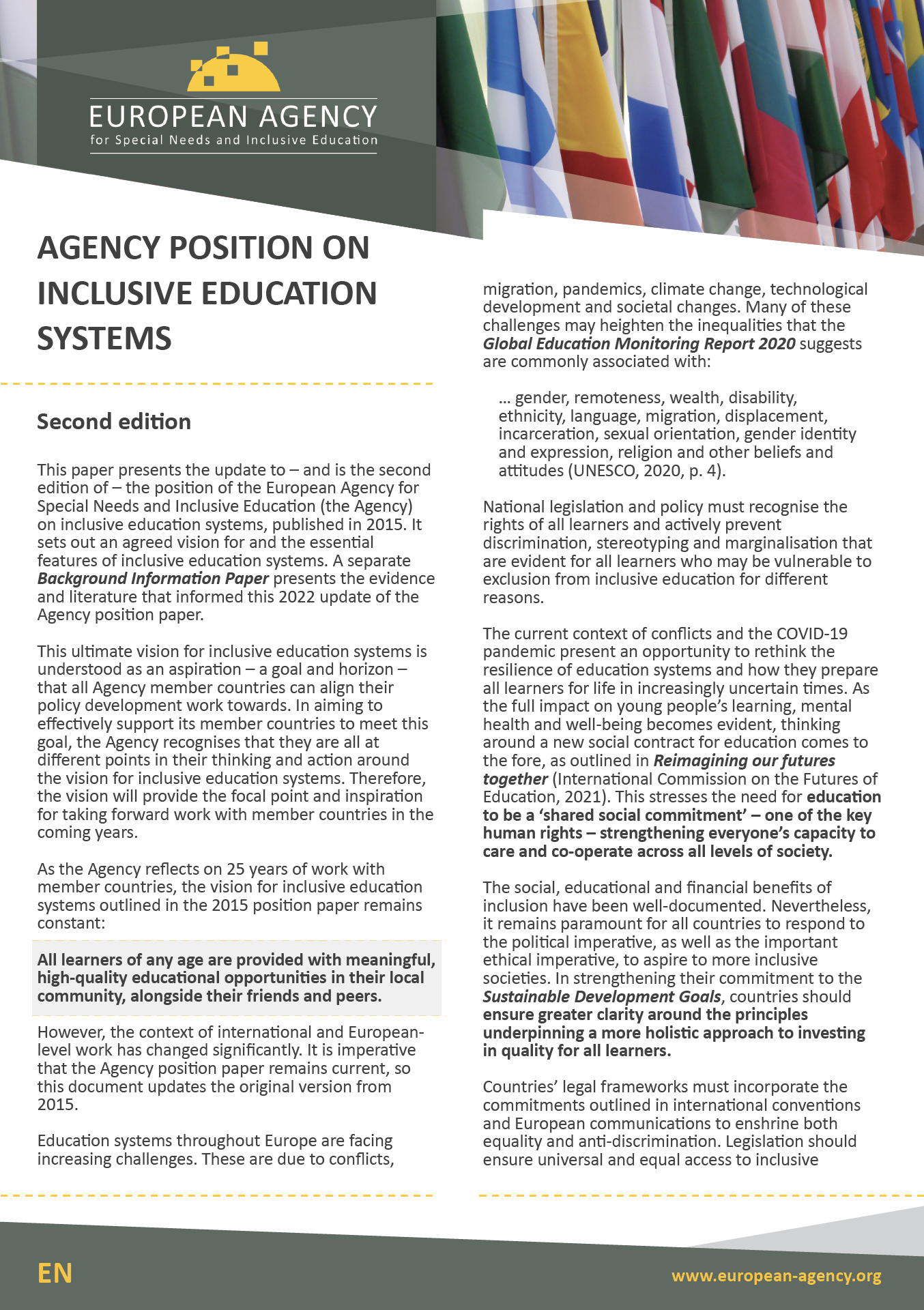As EASNIE reflects on 25 years of work with member countries, its vision for inclusive education systems remains constant:
All learners of any age are provided with meaningful, high-quality educational opportunities in their local community, alongside their friends and peers.
This ultimate vision for inclusive education systems is understood as an aspiration – a goal and horizon – that all EASNIE member countries can align their policy development work towards. In aiming to effectively support its member countries to meet this goal, EASNIE recognises that they are all at different points in their thinking and action around the vision for inclusive education systems. Therefore, the vision will provide the focal point and inspiration for taking forward work with member countries in the coming years.
Education systems throughout Europe are facing increasing challenges. These are due to conflicts, migration, pandemics, climate change, technological development and societal changes. Many of these challenges may heighten inequalities that the Global Education Monitoring Report 2020 suggests are commonly associated with ‘… gender, remoteness, wealth, disability, ethnicity, language, migration, displacement, incarceration, sexual orientation, gender identity and expression, religion and other beliefs and attitudes’ (UNESCO, 2020, p. 4).
National legislation and policy must recognise the rights of all learners and actively prevent discrimination, stereotyping and marginalisation that are evident for all learners who may be vulnerable to exclusion from inclusive education for different reasons.
The current context of conflicts and the COVID-19 pandemic present an opportunity to rethink the resilience of education systems and how they prepare all learners for life in increasingly uncertain times. As the full impact on young people’s learning, mental health and well-being becomes evident, thinking around a new social contract for education comes to the fore, as outlined in Reimagining our futures together (International Commission on the Futures of Education, 2021). This stresses the need for education to be a ‘shared social commitment’ – one of the key human rights – strengthening everyone’s capacity to care and co-operate across all levels of society.
All countries must respond to the political imperative, as well as the important ethical imperative, to aspire to more inclusive societies. In strengthening their commitment to the Sustainable Development Goals, countries should ensure greater clarity around the principles underpinning a more holistic approach to investing in quality for all learners.
Countries’ legal frameworks must incorporate the commitments outlined in international conventions and European communications to enshrine both equality and anti-discrimination. Legislation should ensure universal and equal access to inclusive education without discrimination. It must stress that segregation is a form of discrimination, as is the failure to provide necessary adjustments to ensure that persons with disabilities can enjoy all human rights on an equal basis with others.
Legislation and policy should focus on prevention and intervention approaches to enable all learners to overcome barriers to learning and participate fully, in line with the ultimate vision that all learners of any age are educated in their local community, alongside their friends and peers.
Crucially, to meet current challenges, all education actors must widen their understanding of inclusive education to include ALL learners (UNESCO, 2020). This entails eradicating discrimination, stereotyping and marginalisation mechanisms that exclude learners from opportunities in their local schools and communities. National strategies that target certain minority groups should be extended to enforce the right to education and ensure that every learner matters.
At the heart of future planning is a need for clarity about the meaning of inclusive education. Inclusion in education and equity should not be seen as separate policies, but as principles that underpin and inform all national policies. This includes those on governance, curriculum, assessment, quality assurance, monitoring and evaluation, teacher education, and funding and resource allocation.
Fundamental to quality provision is the development of key competences through professional learning opportunities. Such competences must enable all educators to raise the achievements, outputs and outcomes of the whole education system. Educators should be equipped to adapt or modify the curriculum to provide relevant opportunities for all learners, without recourse to alternative or separate curricula. Personalised approaches should engage all learners, support their active participation and give them a voice in the learning process.
Flexible funding and equitable resource allocation should focus on increasing the capacity of schools and communities to respond to diversity and support all learners. Funding approaches must consider issues around learners’ intersectional needs. Increasingly, it is recognised that learners’ identities overlap and often represent multiple dimensions of diversity. Learners may be exposed to different types of discrimination and disadvantages as a result of the combination of identities. It is evident that labelling learners and, in particular, using labels to decide about provision or access to resources can affect equity.
This increasing recognition of learner diversity and complexity calls for greater collaboration. It will also require a changed role for education professionals, who must be prepared to provide more personalised pedagogies, increased use of digital technologies and more varied learning pathways. School communities will increasingly be required to engage in a process of re-conceptualising the notion of ‘a school’ as an institution that offers more than curriculum content delivery.
Partnerships and networks with stakeholders and local communities will become increasingly important as institutions (such as governments, ministries, regional or local authorities and schools) organise and collaborate in different ways to establish cross-sectoral working. Such working must encompass an understanding of the wider ecosystem for inclusive education systems. It must also account for the key influences on learning and participation within and across system levels, ensuring learner progression and continuity of provision between all phases of education.
Post COVID-19, there may be scope to increase societal awareness of the impact of segregation, isolation and exclusion from the school system. This should underpin a ‘build-back-better’ approach, focusing on capacity-building for all stakeholders and using data to ensure equitable access, inputs and outcomes for ALL learners. Such an approach should tailor work to provide different routes and approaches, informed by countries’ current contexts and past histories – with a focus on continuous improvement and the provision of high-quality, learner-centred education for all.
Download the second edition (2022) of the EASNIE position paper.
A Background Information Paper presents the evidence and literature that informed the update to the 2015 position paper.
View our video on EASNIE’s Vision for Inclusive Education Systems to learn more.
Download the infographic Inclusive Education Across Europe.

